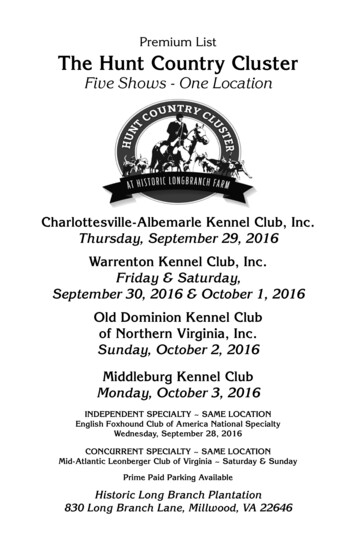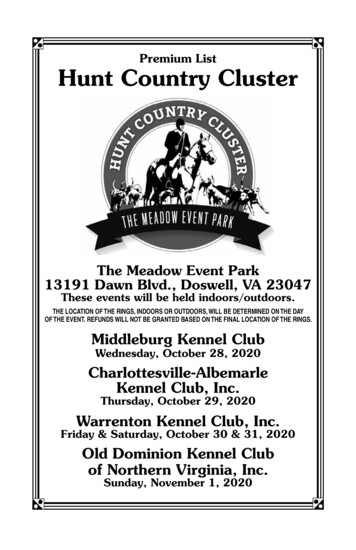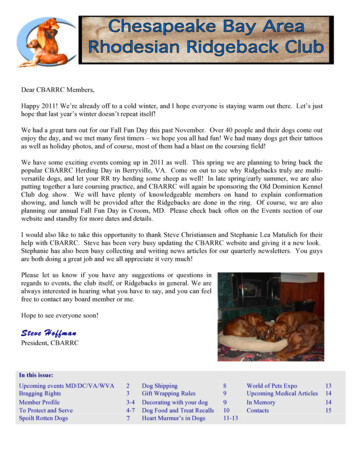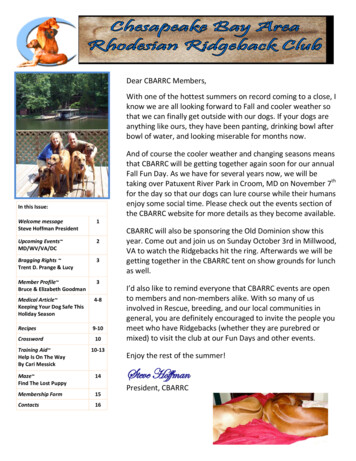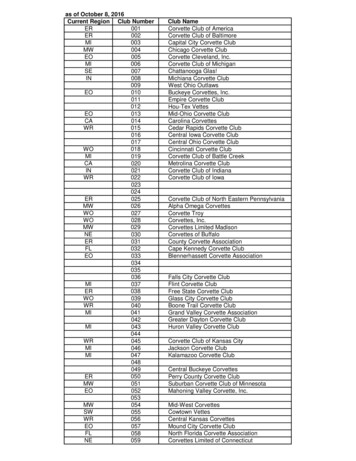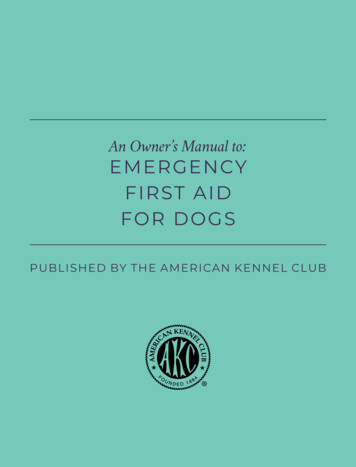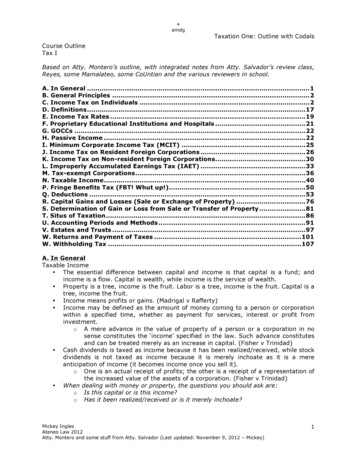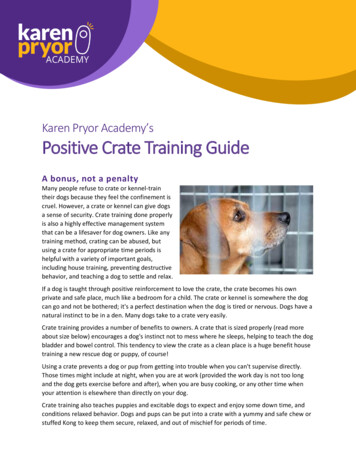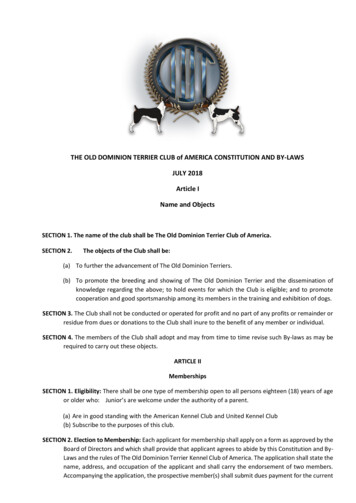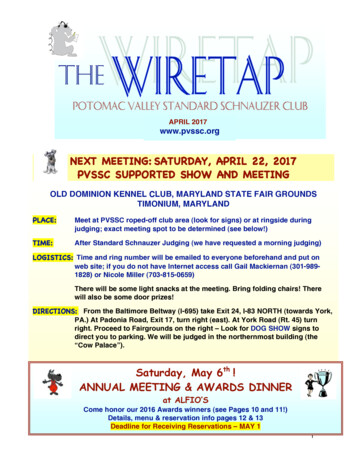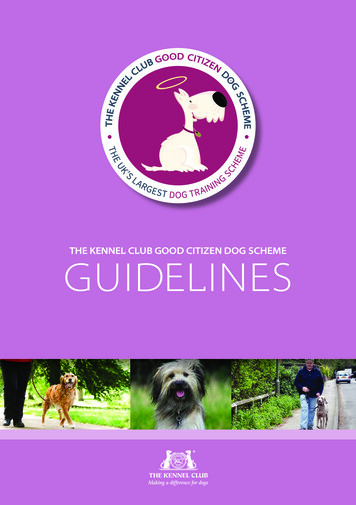
Transcription
THE KENNEL CLUB GOOD CITIZEN DOG SCHEMEGUIDELINES
INTRODUCTIONThe Kennel Club Good Citizen Dog Scheme is a dog trainingprogramme that promotes socially acceptable dogs andcreates responsible dog owners. The Scheme is noncompetitive and is open to dogs of all ages and all breeds,whether Kennel Club registered or not.Since the Scheme’s introduction in 1992, there are now over 1800participating dog training organisations who offer trainingcourses and testing sessions in the UK.Emphasis is placed on the handler’s ability to handle, controland generally care for their dog in a domestic environment.The object of each exercise is to provide a standard of control.
CONTENTS1Host Organisations2Organising a Training Course3Testing Sessions4Advertising and Publicity5Equipment and Trainings Aids6Examiners7Stationery Supplies8Dog Law9Puppy Foundation Award10Bronze Award11Silver Award12Gold Award13Special Pre-Beginner Obedience Stakes14Scheme Services
HOST ORGANISATIONSHOST ORGANISATIONSTHE SCHEME IS EASY TO RUN AND FITS EASILY INTO NEWLY CREATEDOR THE MORE ESTABLISHED DOG TRAINING ORGANISATIONS.A. CLUB REGISTRATION rganising a Good Citizen Dog Scheme courseOand subsequent testing session can only becarried out by a Kennel Club Registered Club/Society or Kennel Club Approved Good CitizenDog Scheme Listed Status Organisation. The host Club/Organisation is responsiblefor arranging all aspects of the testincluding ordering the stationery, briefingthe candidates, appointing an Examiner,overseeing the test and returning the requiredpaperwork after the test has taken place.B. TRAINING COURSES ourse durations range from approximatelyCsix weeks upwards or courses can becontinuous. Good Citizen Dog Schemetraining sessions are normally held forapproximately one hour per week, at aspecific designated time. Home work and practice sessions areencouraged to help advancement andprogression.C. TESTING SESSIONSHOST ORGANISATIONS1F or Bronze, Silver or Gold Award levels only.A test is normally set towards the end of thetraining course term. An external Examiner(see Examiner notes) is invited to attend theClub/Organisation and conduct a test of therequired exercises applicable to each level.Note testing times may take longer thannormal weekly sessions.D. KENNEL CLUB REGISTEREDCLUB/ORGANISATION A Kennel Club Registered Club is a formof registration that encompasses Clubs/Societies and Organisations. It is bound by theKennel Club Code of Practice, pays an annualfee, has officials and committee membersand submits membership lists and annualfinancial accounts. Its assets are owned by the members. The annual renewal date is the 1st January. his type of registration requires the Club/TOrganisation to define exactly what itsinterests and parameters are to be inorder to decide what category of KennelClub Registered Club it is to become. Thecategories are as follows: I. Dog Training Societies: With activitiesconfined to the training of dogs. Onceregistered these societies may holdObedience shows and matches, Agilitytests and matches, Heelwork to Musiccompetitions, Companion Dog Shows, GoodCitizen Dog Scheme training classes andScheme testing sessions and in certain casesWorking Trials and rallies. II. Agility Societies: With activities confinedto the training of dogs. Once registered thesesocieties may hold Agility tests and matches,Heelwork to Music competitions, CompanionDog Shows and Good Citizen Dog Schemetraining classes and Scheme testing sessions. III. Ringcraft Societies: With activitiesconfined to Ringcraft Training (Breed). Onceregistered these societies may hold Breed andObedience matches and Good Citizen DogScheme training classes and Scheme testingsessions. (Exempt from Annual Returns). IV. Breed Clubs: Serving the interests of aspecific breed or sub-group, either nationally7
8HOST ORGANISATIONSor regionally, as defined within its title.Once registered these societies may holdBreed and Obedience shows and matches,Agility tests and matches, Heelwork to Musiccompetitions, Companion Dog Shows andin certain cases Field Trials, Gundog WorkingTests, Good Citizen Dog Scheme trainingclasses and Scheme testing sessions, WorkingTrials and rallies. V. General Societies: Serving the interests ofmore than one breed, either nationally or asdefined within its title. Once registered thesesocieties may hold Breed and Obedienceshows and matches, Agility tests and matches,Heelwork to Music competitions, CompanionDog Shows and in certain cases Field Trials,Gundog Working tests, Good Citizen DogScheme training classes and Scheme testingsessions, Working Trials and rallies. VI. Imported Breed Register Clubs: For breedson the Imported Breed Register, RegisteredBreed Societies will be termed provisional.These societies will be allowed to conductGood Citizen Dog Scheme training classesand Scheme testing sessions. VII. Branches: Breed Societies may apply toregister branches which must be administeredin a similar way to the parent society, withtheir own set of rules and local officers andcommittee. VIII. Other types of Listed Status Organisations:Organisations approved for Agility, Obedience,Rally or or Heelwork to Music (HTM) ListedStatus may hold certain types of limited oropen shows in their own activity. Organisations approved for other typesof Listed Status does not entitle thatorganisation to conduct Good Citizen DogScheme training classes or Scheme testingsessions. Organisations must apply separatelyand additionally for Good Citizen Dog SchemeListed Status.HOST ORGANISATIONSE. CODE OF PRACTICE FOR KENNELCLUB REGISTERED CLUBS I. These Guidelines apply to all Kennel ClubRegistered Clubs/Organisations which hostdog training classes incorporating the KennelClub Good Citizen Dog Scheme (KC GCDS)programme. Copies of these guidelines andthe Canine Code should be given to all courseparticipants.II. It is the responsibility of the Club/Organisation to ensure that the welfare ofthe dog is paramount. No activity shall beconducted which permits, encourages ordevelops aggression in a dog. III. All Good Citizen Dog Scheme courses andtraining conducted must be in accordancewith the Good Citizen Dog Scheme Guidelinesand Information. IV. Clubs/Organisations should ensurethat their instructors are conversant withacknowledged methods of dog training andunderstand the rudiments of dog behaviour– preference should be given to motivationalmethods of training which take into accountthe breed and nature of each individual dogand Scheme testing sessions. V. Instructors must be alert to the differinglevels of experience of both owners and theirdogs, recognise their limitations and shouldalso be courteous at all times. VI. Any training course participant whowitnesses harsh handling at any eventorganised by a Kennel Club Registered Clubmust report the matter to a Club official.Where substantiated, the Club/ Organisationmust report the matter to the Kennel Clubunder rule 11. VII. At the start of each training course,the importance of good dog behaviour,the socialisation of dogs and the theory oftraining should be discussed. Advice mustbe given on choosing suitable collars, leads,identification discs and training equipment. VIII. Handlers must carry some form of ‘PoopScoop’ and remove fouling caused by theirdog and scheme testing sessions. IX. Following the introductory period, courseattendees must participate in training for theKennel Club Good Citizen Dog Scheme. X. At every opportunity the Club/ Organisationshould promote the wider aspects ofresponsible dog ownership. XI. The use of electric shock collars, spikecollars or pinch collars during training ortesting sessions is strictly prohibited.F. KENNEL CLUB APPROVED GOODCITIZEN DOG SCHEME LISTEDSTATUS CLUB OR ORGANISATION ood Citizen Dog Scheme Listed StatusGClubs are bound by a Code of Practice forListed Status Organisations. There is norequirement for these Clubs/Organisations tohave a committee or produce any financialaccounts annually. Once listed, these Clubs/Organisations must hold a minimum of twocourses and/or tests per year. These ListedStatus Organisations are not permitted toconduct shows, matches or rallies. ThisCATEGORIESI. Private Dog Training GroupsII. Dog Training InstructorsIII. Canine CharitiesIV. Dog Training Groups conductedat Armed Forces BasesV. Dog Training Groups conductedby Local Council/AuthorityVI. Veterinary Practices (from puppysocialisation classes or moreadvanced training levels)VII. Agricultural CollegesVIII. Further Education CentresIX. Overseas Dog Training Groups/Organisationsform of registration is open to the followingcategories:G. R EQUIREMENTS FOR LISTEDSTATUS CLUBS/ORGANISATIONS I. Complete the Listed Status Application form.These can be obtained from the Kennel ClubGood Citizen Dog Scheme office upon request. II. Provide confirmation of First Aid facilities. III. Provide confirmation of Third PartyLiability insurance. IV. Provide a reference confirming the safetyand suitability of the premises being usedfor training. Note: if the premises used byone Club/ Organisation are in more thanone location, an additional Listed Statusapplication form and fee may be required. V. Provide a reference confirming the trainingexperience of the main Dog Training Instructor. VI. An annual registration fee is payablea minimum of three years’ experience isrequired for the head training instructor.H. GUIDELINES FOR KENNEL CLUBGOOD CITIZEN DOG SCHEMESTATUS ORGANISATIONS I. Listed Status Organisations which host dogtraining classes incorporating the Kennel ClubGood Citizen Dog Scheme should ensure thatcopies of the Club/Organisation guidelinesare made available to all course participants.Agreement to comply with these guidelines isconfirmed by acceptance of Listed Status. TheListed Status Certificate should be displayedwithin the organisation’s premises. II. It is the responsibility of the organisationto ensure that the welfare of the dog isparamount. No activity shall be conductedwhich permits, encourages or developsaggression in a dog. III. Organisations accepted for Good CitizenDog Scheme Listed Status must conduct atleast two Scheme courses or tests per year.9
10HOST ORGANISATIONS IV. All courses and training conducted mustbe in accordance with the Good Citizen DogScheme Guidelines and Information. V. Organisations should ensure that theirinstructors are conversant with acknowledgedmethods of dog training and understand therudiments of dog behaviour – preferenceshould be given to motivational methods oftraining which take into account the breedand nature of each individual dog. VI. Instructors must be alert to the differinglevels of experience of both owners and theirdogs, recognise their limitations and shouldalso be courteous at all times. Clubs mustprovide good customer service. VII. Any training course participant whowitnesses harsh handling at any eventorganised by a Good Citizen Dog SchemeListed Status organisation must reportthe matter to the course organiser. Wheresubstantiated, the organisation must reportthe matter to the Kennel Club under rule 11. VIII. At the start of each training course,the importance of good dog behaviour,the socialisation of dogs and the theory oftraining should be discussed. Advice mustbe given on choosing suitable collars, leads,identification discs and training equipment. IX. Handlers must carry some form of ‘PoopScoop’ and remove fouling caused by their dog. X. Following the introductory period, courseattendees must participate in training for theKennel Club Good Citizen Dog Scheme. XI. At every opportunity Good Citizen DogScheme Listed Status Organisations shouldpromote the wider aspects of responsible dogownership. XII. The use of electric shock collars, spikecollars or pinch collars during trainingsessions is prohibited. I. TRANSFERRING FROMREGISTERED TO LISTED STATUS Clubs that transfer from Kennel ClubHOST ORGANISATIONSRegistered Club status to Kennel Club GoodCitizen Dog Scheme Listed Status need tohold a special general meeting to dissolve theClub/Society before applying for Listed Status. J. CHANGING A CLUB NAME lubs which wish to amend any part of theCClub’s name will need to apply for approval.In the event of a complete name change, theclub will be required to submit a new ListedStatus application and references. Additionalcosts will be incurred for this service.K. CHANGING THE CO-ORDINATORI f the main Dog Training Instructor (who willnormally be the named co-ordinator of theListed Status Club/Organisation) changes,a new reference confirming the trainingexperience of the new main Dog TrainingInstructor is required before a transfer cantake place.L. CHANGING THE PREMISESI f the premises used by the Listed StatusOrganisation changes, a new referenceconfirming the safety and suitability of thepremises is required in writing.M. MULTIPLE PREMISESI f premises used by one organisation are inmore than one location, an additional ListedStatus application form and fee may berequired for each premises.N. OVERSEAS DOG TRAINING CLUBSAND ORGANISATIONS pplications for Good Citizen Dog SchemeAListed Status membership from overseastraining clubs are accepted subject to furtherconfirmation of references. In addition, theoverseas kennel club of the country wherethe dog training club resides must have areciprocal agreement with the Kennel Club.Contact the Good Citizen Dog Scheme officefor an application form.O. GENERAL RULES FOR ALL HOSTORGANISATIONS I. Minimum age limit – The minimum age limitfor acceptance on training courses is at thediscretion of each individual training Club/Organisation. This will depend on the locationof the venue and may differ from one Club/Organisation to another. II. Breeds of dog – The Scheme is open to allbreeds of dog. III. Vaccinations – Each organisation thatoffers Good Citizen Dog Scheme trainingcourses and testing sessions will set theirstandards for vaccination requirements. Thiswill depend on the location of the venue andmay differ from area to area. IV. Fees – Training course fees will be at thediscretion of the Training Club/ Organisation.It is not permitted to charge a specific fee forallowing a candidate to take a Good CitizenDog Scheme test. V. Safety – It is up to each individualorganisation, club or society to ensure thesafety of all concerned and to supervise classcontrol during training courses and testingsessions. VI. Insurance – It is up to each individualorganisation, club or society to ensure thirdparty liability cover is maintained. VII. Complaints procedure – All complaintsshould be directed to the Kennel ClubGood Citizen Dog Scheme, Clarges Street,London W1J 8AB.11
ORGANISING A TRAINING COURSEreceived, training can commence straightaway. Stationery Orders can be emailed togcds@thekennelclub.org.uk or completedthrough the Kennel Club’s online shop facility.C. HANDOUTS he relevant paperwork is listed in theTScheme levels and on the Description sheetswhich should be given out to each studentat the commencement of each course asapplicable. These should be accompanied bya GCDS Canine Code.D. COURSE DURATION ANDSTANDARDSORGANISING ATRAINING COURSE2 ourse durations range from approximatelyCsix weeks upwards or courses can becontinuous. It will depend on the amountof time spent and the level of each traininggroup as to how long each Award level willtake to achieve. The test is non-competitiveand the Course Training Instructor shouldbe satisfied that dogs are worthy of passingthe required standard before being tested forBronze, Silver or Gold Award levels. For thePuppy Foundation Award, a pass for eachexercise must be achieved before a puppy canbe passed.E. TESTING EQUIPMENTORGANISING A TRAINING COURSEA. NEW CLUBS nce a Club/Organisation is registered orOapproved, they are provided with a letter ofconfirmation and an introductory pack. Thepack includes a Good Citizen Dog SchemeGuidelines Handbook, a stationery order formand a sample of each individual stationeryitem.B. ORDERING STATIONERY nsure all stationery required is requestedEprior to the commencement of each course.Stationery orders take up to 10-14 workingdays to be despatched. Hence early orderingis required. Orders for stationery should becompleted and submitted to the Good CitizenDog Scheme office. Once the stationery is onsider additional equipment that may beCrequired. Each Award Level Description liststhe requirements for each exercise and it isadvisable to read through these before eachtraining course or testing session. Additionalprops such as gates, toys, food bowls, foodand grooming equipment may be requiredas part of the test depending upon the awardlevel you are working towards.F. COLLAR AND IDENTIFICATION ny dog that is presented for testing mustAwear the correct Identification detailsinscribed on the collar or on a tag, plate,disc or barrel attached to it. The correctinformation required to be displayed is thename and the address of the owner. Thetelephone number is optional, but advisable.Handlers that present their dog for testingwith the incorrect information on the collar/tag will be deemed ineligible to be tested.(Please refer to the eligibility section in thenotes for each Award level and the lawrelating to this). The above requirementsapply to any GCDS Award level including thePuppy Foundation Assessment.Microchipping or tattooing are formsof permanent identification and addextra security, if your pet is lost or stolen.Microchipping has been compulsory inNorthern Ireland since 2012, and will becompulsory in England, Scotland and Waleswith effect from the 6th April 2016. Howevermicrochipping will not remove the legalrequirement for all dogs to also bear thecorrect identification details on the collar ortag. Please refer to the Dog Law section forfurther information.G. POOP SCOOPS andlers should carry a poop scoop withHthem at all times and pick up after theirdog as required. This is part of the eligibilityrequirements of the Scheme. Should a dogdefecate during a testing session, providingthe handler picks up after the dog, no furtheraction should be taken.H. LOCATIONS onsider the location required to carry outCthe designated exercises. In the Silver andGold Awards, some exercises have specificrequirements as to how they should becarried out in order to achieve the overallobjective. These may require the use of apublic highway, vehicle or outdoor openspace.13
TESTING SESSIONSTESTING SESSIONSA. PREPARATIONS est preparations should be made at theTbeginning of a training course to ensure allrequirements and values are adhered to. Aseach of the Scheme Awards has set standardsand increases in difficulty the further youprogress, planning all stages of the test willensure events run smoothly.B. PROOF OF ACHIEVEMENT(SILVER AND GOLD) roof of achievement of the previous levelsPmust be sought before testing commences.C. INVITING THE EXAMINER ach Club/Organisation which is approvedEto host Good Citizen Dog Scheme Coursesand testing sessions invites the Examinerto conduct the test. (Please refer to theExaminers Section). Note: an Examiner actingas an individual cannot request stationery.D. COMMUNICATION lear communication between the Club/COrganisation and the Examiner before thetesting sessions will ensure any confusion isavoided. Providing a suitable testing locationand the relevant equipment should be partof the Club/Organisation’s commitment tothe test.E. BRIEFING STUDENTSTESTING SESSIONS3 nsure that all participants taking the testEare briefed as to what to bring with them andwhat to expect during the test. It is advisableto include a practice session prior to the test,which will help your students to understandthe test requirements and how proceduresmay be conducted.F. ALLOWING ENOUGH TIME nsure the test venue is booked for the correctEdate and time and that you have allowedenough time to test the number of students.As an approximate guide:To test 10 Bronze dogs will take 2 hoursTo test 10 Silver dogs will take 2½ hoursTo test 10 Gold dogs will take 3 hoursG. EXAMINER STYLE emember Examiners will have their ownRstyle of setting up and conducting a testingsession, therefore it is worth practising variousways of achieving an exercise. Always refer tothe object of the test for further clarification.H. USING AN APPROPRIATE VENUE nsure the venue(s) being used is appropriateEto conduct the test(s) taking place. In theSilver and Gold Award tests, some of theexercises must be conducted at an outdoorlocation. Consideration as to the suitabilityof the location used is imperative to thesmooth running of the test. Public Highways,isolated areas and environments with suitabledistractions should be well thought out. Alsoif your Club or Organisation holds severaltraining sessions in the same timeslot, it maybe appropriate on the test day to reducethe number of training sessions or arrangedifferent times for other training groups onthat day. This will help to minimise disruptionduring the testing session.I. EXAMINER SUPPORT nsure the Examiner who has been invited toEconduct the test has received a copy of theDescription of the relevant test requirements15
16TESTING SESSIONSand a copy of the Kennel Club Good CitizenDog Scheme Guidelines. Additional copiesof this handbook can be purchased from theKennel Club.J.ADDITIONAL EQUIPMENT he gate or suitable doorway required for aTBronze test should be provided by the Club/Organisation hosting the test.K. STATIONERY ll paperwork required for a test should beAobtained by the host organisation from theKennel Club, through the completion ofa stationery order form. Orders should beplaced prior to the commencement of eachnew course and at least one month priorto the test date. Participants should havereceived all the relevant paperwork at thecommencement of the course. Examinersmay check this information to ensure allcandidates have been fully briefed.L. EVENTS here a Bronze Award test is taking placeWat an approved event (see ‘Companion DogShows and Events’ in this section) ensureparticipants have obtained a Description ofthe relevant test. This will ensure participantsare advised of all the eligibility requirementsand equipment to bring with them. It isadvisable to have some administrationsupplies available on the day.M. STANDARDS REQUIRED onsider the standard of your students andCtheir dog’s ability before putting them forwardfor the test. Whilst most dog training coursesrange in duration from six weeks upwards,even the most consistent dogs can act out ofcharacter in a test situation. Try and preparestudents for all eventualities. Participants arepermitted only one attempt at each exerciseunder test.TESTING SESSIONSN. PRACTISING FOR TESTSI t is always advisable to practise an exercisein more than one place and in more than oneway.O. SAFETY CONCERNS ccasionally students and their dogs mayOclearly have not reached the standardrequired to pass the test. As a CourseInstructor, in the event of any safety concernsyou may have which would put a dog,handler or Examiner at risk, you should askthe hosting Club or Organisation to takeappropriate action, prior to the test. AnExaminer should not be placed in a situationwhere a dog under test is likely to put them atrisk or obstruct the test proceedings. Likewise,during a test, a student should not be placedin a situation which comprises the safety oftheir dog, due to insufficient control.P. EXPENSES hen appointing an examiner for a test, takeWinto account the distance the examiner willhave to travel to the venue. Consider offeringexpenses where applicable. Refreshments arealways well received, especially during longperiods and outdoor testing. A small thank yougift can be a nice token of appreciation too.Q. APPOINTING AN EXAMINERI t is advisable to appoint an external Examiner(see section 6 Examiners) who is not amember of your Club or Organisation. TheExaminer must meet the Examining criteriaand must not have have been involved in thetraining of any of the students under test forthat particular level.R. STEWARDS he caller steward should play no part inTthe manner in which the exercises makingup the test are conducted. This is entirely atthe discretion of the examiner. Examinersmust ensure that their testing instructionsare complied with. Note: It is advisable to usesomeone other than the class instructor to actas the steward.S. COMPLETING THE PAPERWORK he Examiner should complete the Test SheetTduring the test and this information is thentransferred onto the Test Register form. TheTest Register form is returned to the GoodCitizen Dog Scheme office and the Test Sheetform is kept by the hosting Training Club/Organisation. It is advisable for the Club/Organisation to keep a copy of the TestRegister also for their records. Test Registerforms should be returned to the Good CitizenDog Scheme office within 28 days followingthe test date.T. ATTEMPTING MULTIPLE TESTAWARDSI t is recommended that only one level perdog is attempted. Attempting two levels onthe same day with the same dog is permittedalthough in this instance a different examinermust be used for each level. Attempting threeawards on the same day is not permitted. Adog may attempt the same test level morethan once with a different handler. Emphasisis placed on the handler’s ability to handle,care for and generally be responsible fortheir dog. A dog must pass each exercise inorder to receive a certificate. Under test, if adog is deemed ‘Not Ready’, it must re-take allexercises the next time it is tested in order toreceive a certificate.U. PRESENTING THE CERTIFICATES chieving a Good Citizen Dog Scheme AwardAis a worthwhile accolade and thereforewhen students have achieved the requiredstandards, the presentation ceremony forthese awards should be meaningful. Wherepossible, try to conduct this in a groupenvironment and make the most of thesuccesses that have been gained.V. COMPANION DOG SHOWS &EVENTS nly Bronze Award tests can be conductedOat Companion Dog Shows under supervisionand approval of a Kennel Club Registered orKennel Club GCDS Listed Status organisation.At these events only Kennel Club A ListExaminers (Examiners who have passed aKCGCDS Examiner Assessment Course - seesection 6 Examiners) will be permitted toexamine. Silver and Gold testing sessions arenot allowed to be conducted at CompanionDog Shows. Special permission may begranted to other specific ‘one day events’hosted by a Kennel Club Registered orKennel Club GCDS Listed Status organisationproviding the event meets with approval ofthe Good Citizen Dog Scheme office and issubject to specified criteria relating to venuesafety and examining standards. In theseinstances, clubs should contact the GCDSoffice directly for further information.W. GUEST ATTENDEESI t is acceptable to have a guest handlerand dog attend a testing session with theagreement of the Club/Organisation.17
ADVERTISING AND PUBLICITYADVERTISING AND PUBLICITYA. ADVERTISING osters have been prepared to allow aPspace for your Club’s contact name andtelephone number or perhaps details of thevenue used for your Club’s training sessions.This information should be added to theposters before distribution. It is suggestedthat POSTERS and LEAFLETS are distributedto Libraries, Veterinary Surgeries, Schools,Council Offices, park notice boards, localshops and any other suitable available outletwith the dates/times of Good Citizen DogScheme training sessions.B. KENNEL CLUB LOGOS he Kennel Club logos and Kennel ClubTGood Citizen Dog Scheme are the trademarkand copyright property of the Kennel Cluband should not be copied or duplicated. It isnot permitted to use the Kennel Club GoodCitizen Dog Scheme logo on any website, Clubdocumentation, merchandise or stationery.Special permission to use the logo for articlesand media coverage should be requestedfrom the GCDS office.C. PUBLICITYADVERTISINGAND PUBLICITY4 separate publicity information sheet isAsupplied with each Good Citizen Dog Schemeadministration pack, which provides thelatest information and Scheme details. TheKennel Club Press Office can provide yourorganisation with a list of local press withinyour area. Please contact the Good CitizenDog Scheme office for further details. It is essential for the success of this Schemethat publicity is continuous throughnewspaper articles, distribution of postersand “word of mouth”.D. PUBLIC RELATIONS Press Release has been prepared (availableAwith your pack) which can be adaptedand sent to the local papers with suitablepictures of your organisation’s trainingsessions. At first it would be advisable tosend this information to the papers at thecommencement of each training session,and a short article providing details aboutyour organisation could also be preparedwith pictures following each test night.E. INVITING DIGNITARIESY ou could invite the Mayor, local Councillors,dignitaries, celebrities, editors of localpress etc. to a training session, a test nightor to present the Certificates. Providedadvanced publicity of these visits is givenby an advertisement in the local paper, or aletter to the paper suggesting a reporter bepresent, this will attract the general public.To improve the chances of publication, itis advisable to send an article to the localpaper, preferably with a photograph.19
EQUIPMENT AND TRAINING AIDSEQUIPMENT AND TRAINING AIDSA. TOYS, FOOD & CLICKERS oys, food and clickers can be useful trainingTaids. During a testing session, unless requiredas part of the exercise, they should not becarried in the hand or used during the testexercises.B. SLIP LEADS AND BODYHARNESSES lip leads and Body Harnesses areSpermissible providing they are suitable forthe type/breed of dog. All equipment must beattached to a lead and with the name and theaddress of the owner inscribed on the collaror on a plate or tag attached to it.C. MUZZLES uzzles are not permitted to be used duringMPuppy Foundation Assessments, or Bronze,Silver and Gold Award testing sessions. Dogsw
I. Dog Training Societies: With activities confined to the training of dogs. Once . registered these societies may hold Obedience shows and matches, Agility tests and matches, Heelwork to Music competitions, Companion Dog Shows, Good Citizen Dog Scheme training classes and Scheme testing sess
